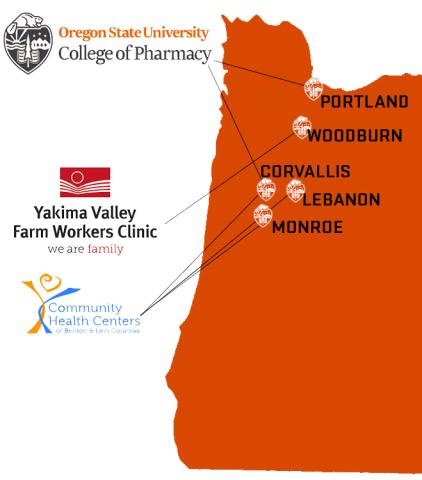Responsibilities
All residents at OSU participate in various patient care, teaching and educational activities:
- Manage chronic disease states
- Work as a member of an interdisciplinary care team through the use of collaborative practice agreements
- Precept pharmacy students and take part in didactic teaching and small group facilitation at the College of Pharmacy
- Oregon Pharmacy Teaching Certificate available
- Complete a mentored, longitudinal research project with presentation opportunities at local, regional, and national meetings
Benefits
Individuals appointed to the school’s residency programs are entitled to the following:
- Yearly stipend of approximately $47,500
- Professional liability insurance provided at affiliated institutional sites
- Benefits include 10 personal leave days (including sick days); 9 observed holidays; and Medical, Dental, and Vision coverage.
- Upon completion of their training, OSU residents are highly sought after and typically accept positions in clinical services and academia.
Requirements
To be admitted to one of the OSU College of Pharmacy’s residency programs, you must have obtained:
- Graduate of an Accreditation Council for Pharmacy Education (ACPE)- accredited School or College of Pharmacy
- Doctor of Pharmacy (preferred)
- Licensed or eligible for licensure in Oregon
- National Resident Matching Program participant
Contact Us
Residency Program Director
203 Pharmacy Building
Corvallis, OR 97331
541-737-5791
Admission
The OSU College of Pharmacy’s residency programs provides exceptional clinical preparation and education. Entry into the programs is competitive and applicants are encouraged to review all admission requirements and deadlines prior to beginning the application process.
OSU commits to inclusive excellence by advancing equity and diversity in all that we do. We are an Affirmative Action/Equal Opportunity employer, and particularly encourage applications from members of historically underrepresented racial/ethnic groups, women, individuals with disabilities, veterans, LGBTQ community members, and others who demonstrate the ability to help us achieve our vision of a diverse and inclusive community.
Leadership and Professional Development
Resident activities also include community practice, primary care practice, drug therapy preparation and distribution, and clinical research. Clinical practice activities vary depending on the area of practice.
Community Pharmacy Program
The OSU College of Pharmacy Community Pharmacy program was established as a single site program in 2011. In 2016, the program expanded to a multi-site program which includes OSU College of Pharmacy, Community Health Centers of Benton and Linn Counties and Yakima Valley Farm Worker’s Clinic.
Purpose Statement
The purpose of the Oregon State University College of Pharmacy PGY-1 Community‐Based Pharmacy Residency Program is to build upon the Doctor of Pharmacy (PharmD) education and outcomes to develop community‐based pharmacist practitioners with diverse patient care, leadership, and education skills. This residency prepares pharmacists to pursue advanced training opportunities, including professional certifications.
- Engage in 340B pharmacy practices and provide care to underserved populations
- Provide direct patient care in ambulatory settings
- Participate in team-based health care
- Provide clinical pharmacy services in a patient-centered primary care home
- Serve as an educator of patients and health care providers
- Instruct and precept pharmacy students in various settings
- Gain the skills and experience needed to operate and manage a community pharmacy
- Facilitate interrelationships between, and within, the healthcare systems in our community to deliver high quality, culturally appropriate care and to improve patient transitions between care settings.
Outcomes
The resident will be involved in OSU orientation, residency orientation, and pharmacy orientation during this experience. The resident will be scheduled to work in different areas within the pharmacy department to develop a baseline comfort level of pharmacy practice at their primary site to be further developed during the service component of residency. The resident will interact with clinic pharmacists, pharmacy technicians, physicians, nurses, and other clinic staff. Self-motivation, willingness to learn and good communication is vital to success in this experience.
Learning Experiences
Orientation
The resident will be involved in residency, pharmacy, and clinic orientations during this experience. The resident will be scheduled to work in different areas within the pharmacy department to develop a baseline comfort level of pharmacy practice at their primary site to be further developed during the rest of the residency. The resident will interact with clinic pharmacists, pharmacy technicians, physicians, nurses, and other clinic staff. Self-motivation, willingness to learn, and good communication is vital to succeed in this residency program.
Core Topics
- Practice Development and Management
- Collaborative drug therapy management agreement and standards of care development
- Business Plan Development
- Professional Development
- Drug information presentations (Provider education and literature review)
Staffing/Administration
During this longitudinal rotation, the resident will build skills in utilizing the pharmacy dispensing software and will be responsible for taking on pharmacist tasks. Pharmacist tasks include: performing pre-verification, writing prescriptions, and final verification on prescriptions (ensuring correct drug, dose, interactions, and appropriateness of therapy). The resident will also be responsible for counseling patients on prescriptions, OTC recommendations, calling prescribers for clarification, and answering patient and provider questions. Daily responsibilities of the pharmacist include: providing patient care by counseling, preparing medications for dispensing, conducting drug utilization reviews (DUR), drug therapy dose checking and recommendations. Throughout the year resident will assume greater responsibilities in the pharmacy including participating in operations and management tasks, and supervising/directing technicians and students on APPE rotations.
Communications skills are essential for success on this rotation, and the in this residency program. The resident will need to have clear communication with pharmacy staff, clinic staff, providers, and especially patients. The resident will need a good foundational knowledge of commonly prescribed medications and counseling points. The resident also will need problem-solving skills to identify and resolve medication-related concerns and questions that arise on the rotation.
Common disease states encountered in this residency program in which the resident will be expected to gain proficiency through reviewing medication information resources, guidelines, and/or direct patient care include, but are not limited to: diabetes, hypertension, anticoagulation, and pain management.
Administration- The pharmacy resident is responsible for becoming familiar with the daily requirements needed to maintain the outpatient pharmacy and a clinical pharmacy service. The resident will develop skills to perform various management duties such as scheduling, developing policies and procedures and working with others on the executive team. Good organization skills to balance projects and communication skills with the pharmacy team, medical providers. and executive team are necessary to be successful in this learning experience.
Project
The major project is a required, longitudinal learning experience to provide the resident with an opportunity to apply project management, research, leadership, and communication skills while conducting practice-based research. The resident will be the Principal Investigator (PI) and will be in control of all major aspects of the project including developing the study design and methodology, implementing the intervention and data collection, analyzing the collected data, and disseminating the knowledge gained from the scholarly work.
The pharmacy resident will meet early in the residency year with the preceptor and RPD to validate that the scope of the project can be reasonably accomplished during the residency year and to begin the process of required peer and institutional review before the project can be started. The resident will meet regularly with the preceptor for guidance on the project and to ensure compliance with established timelines.
Successful completion of this learning experience will require the resident to author a platform presentation, and final manuscript on their project.
Teaching/Academia
The teaching rotation is a required, longitudinal learning experience to familiarize the resident with the Oregon State University College of Pharmacy and the role of the pharmacy practice faculty member. The College of Pharmacy at Oregon State University offers a four-year, didactic curriculum leading to the PharmD degree. PharmD students spend two years on the Corvallis campus taking courses that will serve as a foundation in the pharmaceutical sciences. The third professional year is spent at Oregon Health & Science University (OHSU) in the new Collaborative Life Sciences Building developing skills in pharmacy practice. The final year implements all that the student learned through hands-on experience at various pharmacy practice locations throughout the Northwest or around the world.
The pharmacy resident will complete the required courses and assignments for the Oregon Pharmacy Teaching Certificate. The resident will have the opportunity to practice small group facilitation while paired with a faculty member for a course in the P1 or P2 year. The resident will also gain precepting experience with APPE students on rotation when available. The resident may also have the opportunity to gain insight into faculty development and life in academia including managing services, scholarship, and teaching through discussions with faculty members and administrators.
Good time management and communication skills with faculty and students are necessary to be successful in this learning experience. Confidence in delivering presentations to small and large groups is also a necessary skill for this rotation.
Ambulatory Care
The clinical programs and direct patient care experience is a longitudinal training experience taking place August through June. The learning experience encompasses pharmacist-driven outreach for medication adherence, diabetes, anticoagulation, and other patient care services.
The resident will collaborate with health care professionals to improve health literacy in culturally diverse and underserved patient populations. The resident will work directly with providers to assure that patients' medication lists are reconciled and therapy is adherent to disease state guidelines and work with patients to address medication adherence.
Professional Development/Management
Practice management and professional development is a required, longitudinal learning experience. Discussions and activities are designed to address issues pertaining to application of clinical knowledge and development of clinical practice; pharmacy and formulary decision making; professional involvement in local, state and national pharmacy affairs; interprofessional education; performing as a role model for pharmacy students; and continuous professional development through self-assessment and goal setting. Successful completion of the learning experience will require active participation in weekly OSU Residency Conference meetings and bi-weekly/monthly Citywide Residency Conference meetings and as well as involvement in professional organizations including student health fairs.

